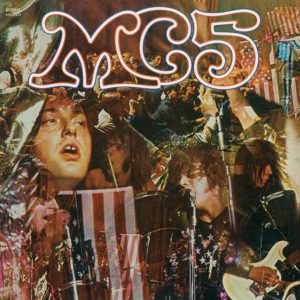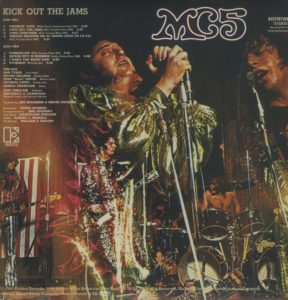Marketplace
2012 Rhino Records PRESSING
- Catalog Number R174042
- Release Year 2012
- Vinyl Mastering Engineer Chris Bellman
- Pressing Weight 180g
- Jacket Style Gatefold
- 100% Analog Mastering Yes
- Original Release Year 1969
- Original Label Elektra
- Original Catalog Number EKS-74042
When listening to this album I think of this band or music:
Despite its short life, MC5 lived on when its guitarist Fred “Sonic” Smith married Patti Smith and collaborated with her for the rest of his short life. Patti Smith’s raw, powerful voice remind me of the hurricane force the MC5 unleashed at various venues around Detroit in the late 1960s.
Music from this album would be a great soundtrack to this movie:
Move over Jerry Goldsmith, and let’s try a little MC5 music in some science-fiction films, replacing Goldsmith’s score for Planet of the Apes or Logan’s Run. Whether apes are ruling the world or a government mandates death at the age of 30 to conserve resources, stay alive with the MC5!
If ever an album was a sign of its times, Kick Out the Jams would contend for top prize in the prediction category. As the record’s liner notes say, the band was “totally committed to the revolution” and making music “that will drive us wild into the streets of America yelling and screaming and tearing down everything that would keep people slaves.” If the prose seems over the top, remember that the words were written in December 1968—and that the members of the Detroit band witnessed the Detroit race riots a little more than a year earlier. The Vietnam War was also ripping up the social fabric. And the Watergate scandal and punk rock, the latter echoing MC5’s rejection of the “peace and love” strand of the period, would soon happen.
Like the members of MC5 (“Motor City 5”), I grew up in the suburbs of Detroit. The band first came to my attention when its “Minister of Information” John Sinclair got banned from speaking at my high school because of his advocacy of marijuana. A few years later, I was living in the Detroit inner city, a few blocks from the office of Creem Magazine in one direction and a half-mile walk to Motown’s Hitsville studios in the other. Even in those tumultuous times, with a new anti-war protest event unfolding almost daily, MC5 stood out from other rock groups. It was louder, more profane, and possessed a level of energy unmatched by other acts. The title track of Kick Out the Jams, heard with the original lyrics (the word “motherfucker” was replaced by “brothers and sisters” in repress), sounded breathtaking. No one described things as “awesome” back then, but that’s exactly what MC5 was in the most honest, undiluted sense of the term. Far too honest for record companies and the record-buying public, the band disintegrated a few years after releasing its debut—about the same time I left Detroit for the left coast. The importance of MC5’s music has become more obvious with each new generation.
Kick Out the Jams represents a full-on live assault and makes little effort to employ a broad dynamic range—it’s pretty much loud or louder. Notwithstanding such limitations, the sound of the recording is excellent for a live show. Rob Tyner’s vocals feature him screaming into the microphone. The three guitar players are all distinguishable and the drums well balanced. Rhino’s reissue fleshes out the sound of the drums and guitar slightly better than the original, but the improvement is not earthshattering. If you have an original in good shape, there’s no need to spring for the reissue. If you don’t, grab the reissue. Rhino also packaged the LP as part of its Total Assault 3-LP box set as a red-vinyl pressing (the other two discs are white and blue, respectively). It touts the same mastering as the standard Rhino issue, except it comes pressed on lighter-weight red vinyl and the high-quality heavy board cover used for the individual release is replaced by lightweight card stock.
Kick Out The Jams



 4.5
4.5